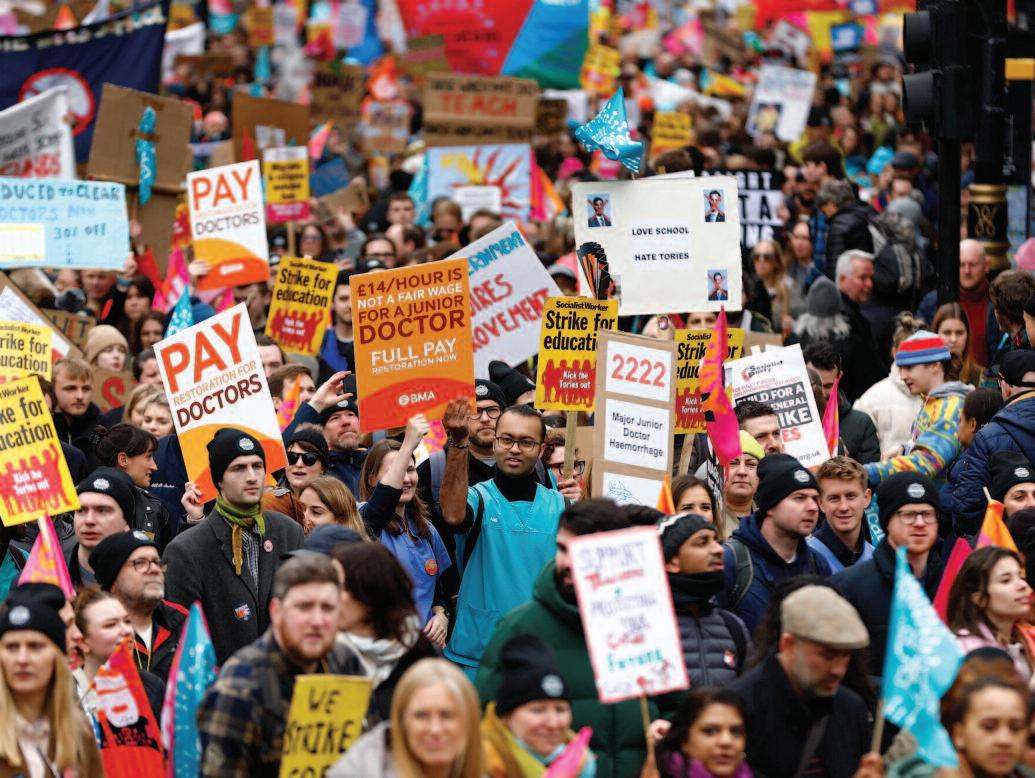
11 minute read
t He Ge neral st riKe to day our collective power in action
between June and December 2022, 2,471,000 days were lost to strike ac tion in britain and Nor thern ireland, the highest number since 1989. in this ar ticle, S e á N b u r N S analyses the impor tance of the general strike today, which recently became a topic of discussion in the wake of the strike wave in britain and the Nor th.
On 1 February 2023, half-a-million workers went on strike in a huge 'day of action' for fair pay rises and against the Tories' anti-union legislation Discussions about a general strike naturally became a talking point on picket lines and on social media; it made sense to workers that rather than having separate strikes, they should all come out together, at the same time, to maximise their impact
The press caught wind of these discussions and speculation about a general strike being called was rife. Headlines included 'UK could be moving towards de facto general strike', and 'General strike 'increasingly likely' in 2023'.

Unfortunately, it now seems many of the union leaders in Britain and the North are orchestrating retreats, accepting below-inflation pay offers and suspending action. At least temporarily, it is likely we will see a lull in the strike wave But the question of a general strike may resurface as new ballots and struggles open up Examining this idea is a key question for the workers' movement
The generalised nature of capitalism's assault on our rights and living standards requires a general response that goes beyond localised, individualised disputes and ties together the experiences of every worker United campaigns and protest movements are extremely important in the struggle against the system's attacks, but the most powerful weapon in the arsenal of the working class is the general strike – it utilises the fundamental power of the working class as the producers, distributors, providers, carers etc. in society, without whom society can't function, by withdrawing from that collective labour until their demands are met Impressive examples of general strikes have been witnessed in recent years, not least the general strike of nearly 250 million workers across India on 26 November 2020 against the far-right Modi government's anti-labour policies and neo-liberal attacks on the living standards of farmers. After over a year of industrial action and mass protests, the farmers and workers won a historic victory and forced the repeal of Modi’s three brutal agricultural laws Other notable examples are the feminist strikes seen in the last decade, for example in the Spanish State where in 2018 an estimated 5 million people joined a strike against gender-based violence
what is a general strike?

A general strike is a strike which involves simultaneous strike action by multiple sectors The coming together of millions of workers on strike is both a massive morale boost to those on strike, who see that so many other workers are with them, feeling their collective power, but also the most significant and effective action workers can take in battle with employers. Even a oneday general strike shows clear-as-day who really runs society
Crucially, it is also a direct confrontation with the government of the day. There have been various types of general strikes throughout history: from those that have won significant victories, including some that have posed the potential overthrow of the entire ruling class and their system, but also those that have been exercises in 'blowing off steam' – leading to compromises or defeats
Britain has experienced a general strike once before, in 1926. Nearly 2 million people joined the strike action that lasted for nine days. The strike was called in response to attacks on miners from employers and the state The Trade Union Congress (TUC) called it but only under pressure from below. The real power of that action lay in the strength of organisation of the working class In Glasgow, one Clydeside striker at the time painted a picture of that strength:
'The central strike committees and the councils of action were 24 hours a day in session They had their own transport; they stopped all other forms of transport, but they had their own courier system to carry messages because there was no such thing as postal services, no such thing as the press The press had turned in 100% and stopped all the papers '
The 1926 General Strike illustrated in a very transparent way who runs society. It was an indefinite general strike, i e not a once-off action and lasted for nine consecutive days In such a scenario, it is not possible to simply shut down society, because workers would quickly encounter problems in accessing basic goods and services such as food and healthcare Hence, it is quickly evident that workers must take control over the running of society and this is what happened during many such events. The strike committees referenced in the above quote illustrate workers taking control of society and organising production and services Prime Minister Lloyd George in 1919 would sum this up perfectly when he said:
'For, if a force arises which is stronger than the state itself, then it must be ready to take on the functions of the state, or withdraw and accept the authority of the state Gentlemen, have you considered, and if you have, are you ready?'
A similar situation is shown in the 1979 Iranian Revolution The establishment of shoras, literally translated as 'the council', were bodies of workers central to the mobilisations to overthrow the Shah. The shoras developed out of the real needs of the working class after the collapse of the Shah's regime Many owners and managers, particularly of state-owned firms close to the regime, had fled. The workers took over the factories and ran them through their councils. Both of these movements had elements of what Marxists call 'dual power', i e all the bodies of official society that we know today, the parliament, employers, police, etc. are suspended in midair unable to operate and ordinary people take control of how things are run These strike committees, if they were joined up, were the embryo of a new state, inherently a state of a totally different kind – one based on democracy from the bottom up
The situations outlined above are obviously very different to the situation today. Decades of attacks on the trade union and workers' movement and capitulation by bureaucratic leaderships have had a real effect, leading to a weakening of working-class organisation, and in turn a diminishing in confidence of its collective weight and power in society. General strikes have happened in the recent past, but precisely because of this pushing back of organisation and consciousness, they have not posed the question of dual power – of who could and should take over the running of society – in the same way
the example of workers in France
At the time of writing, millions have joined nationwide strike actions in France against the attacks on pension rights and the draconian measures the Macron presidency is using to push them through, namely, Article 49.3 in the French Constitution, which allows him to enact legislation regardless of the votes taken in the National Assembly (French Parliament) According to the CGT union, 3 5 million marched on 7 March 2023 against the proposed pension reforms. This follows millions striking and demonstrating in January Such mobilisations are incredibly impactful and are exerting immense pressure on the Macron regime – his poll ratings have plummeted.

These strikes are inherently political They do not just confront an individual employer but rather the employer class as a whole and its allies in the political establishment Despite the vast majority of French people opposing the pension reforms and supporting the strikes, the government has not given in. Strikes such as this are what Lenin referred to as 'a school of war,' because they expose, in a way few other things do so clearly, the reality of capitalism: that when push comes to shove all the institutions of our society – the police, the courts, the parliaments – will act in the interests of the powerful and wealthy elite
In France, a key debate of the strike wave has been the idea of a 'renewable strike' whereby workers’ assemblies vote to continue or discontinue the strike action indefinitely as part of a general strike The call for this approach has been put out by the left unions It is a positive call and reflective of what is necessary to win. Another day of action spread across a period of months is not enough to secure a victory Spread out national days of action, while significant, can be brushed off. What the Government and the employers cannot ignore is continuous strike action from such a broad section of the workforce By pursuing a strategy that escalates action and expands its scale – ensuring broader support is built up along the way – is the way to secure a victory.
Crucially, this action needs to be organised from below with the election of strike committees in every workplace, school and district and linked up on local, regional and national level. Furthermore, this needs to be linked with the struggle for power; to bring down this 'President of the Rich' and fight for a democratic socialist government that can really meet the demands of the movement and go further – to take power (ownership of the economy) back from the capitalist class
could this happen here?
In the recent strike wave in Britain, the Tories have unleashed a political attack upon the union movement They are using legislation to back up the employers and attack the right to strike. The introduction of the Strikes (Minimum Service Levels) Bill would render effective action in many sectors redundant This comes alongside the Public Order Bill, which would give police the power to shut down protests if they 'might' cause 'widespread disruption' These are direct attacks on the democratic rights of working-class people to organise. The trade union movement cannot shy away from confronting these attacks. The day of action on 1 February, which saw half a million workers on strike, was an important first step Unfortunately, it does not look as if this will be built on in any serious way by the trade union leadership.
The TUC appears to be relying on the courts to save the day, notwithstanding that this is the same legal system that upheld previous attacks on the right to organise. Norman Tebbitt's 1982 Employment Act substituted the meaning of trade dispute as occurring 'between employers and workers’ to 'between workers and their employer.' The act rendered sympathy strikes unlawful. The legislation narrowly defined trade disputes as relating to problems like pay, conditions, and discipline and made political strikes illegal The anti-trade union laws brought in by David Cameron further restricted the unions – limiting picketing to six people and introducing a minimum turnout threshold These are the same courts that upheld an injunction from Royal Mail against CWU strike action in 2020. They did not protect our rights then and we cannot rely on them to do so now
As in France, it is necessary to confront these attacks head-on. The TUC/ICTU wish to confine disputes to individual employers out of a fear that generalising strike action would be unpopular The TUC General Secretary stated as much to The Financial Times: 'it would make little sense to groups as disparate as teachers and physiotherapists who were worried about pay, but hardly inclined to militancy ' Such a view is the opposite of reality! The mood was there for the calling of a general strike – it was clearly articulated by workers on the picket lines Mick Lynch, the leader of the RMT, reflected the sentiment in saying that 'if they (TUC) call it, we'll support it' We can see from motions demanding coordination passed at various union conferences, including the TUC's own conference, that this was present.
Legal Barriers Can Be Fought
The other major contention of the TUC to calling a general strike is the legality of it. It is true that the direct calling of a general strike, even a 24-hour one, would run afoul of the anti-union laws But where there's a will, there's a way In 2011, over 2 million public sector workers from 30 different unions went on strike at the same time. Such action is possible even with the restrictive laws in place With so many ballots in place simultaneously, there was a clear opportunity to call for them to coincide and for new ballots from other sectors to be organised for the same time. Organising action in this way would not breach the anti-trade union laws, but would effectively be a general strike. This would have been a powerful response to the Tories' plans – the very thing they have feared for so long
However, we do not have to limit ourselves to obeying unjust laws - they can be fought. The threat of union funds being sequestered as punishment for supposedly 'illegal' strike action can be resisted The Miners' Strike in 1984 illustrates how During the strike, £750,000 was collected by the Gwent Food Fund alone, which in today's money would be valued at £3,084,319 62 Ukrainian miners raised 50,000 roubles (£46,000) for their British counterparts, the equivalent of £189,171.60 today. Overall, over £60 million was raised to support the miners, the equivalent of £246,745,569 70 today, according to The Guardian
Undoubtedly, if the RMT or other unions faced legal attacks, funds could be secured and the union defended both inside and outside the courtroom We need union leaders who are prepared to break laws when it is in the best interests of working-class people. This should not be done carelessly, but only when there is the strength to back it up

Militant ac tion necessar y
It is clear from the recent strike wave that neither ICTU nor the TUC have the wherewithal to organise the kind of action necessary to push back this government They have committed themselves to a strategy that is summed up in appealing to the establishment for a better deal This is not effective Well-organised, militant strike action is what gets results, as illustrated by workers in Liverpool docks who took significant strike action in 2022 and gained pay rises worth 14.3%18 5% Similarly, workers at Interface Europe, a flooring manufacturer based in Craigavon, won a 15 3% pay increase after taking a week of continuous strike action, and 4,800 Open University workers were de-casualised as a result of the UCU industrial action
The real strength of the union lies in the membership. In too many disputes, however, strategy is dictated by union officials, often unelected, who are incapable of developing strategies that are effective Workers are best placed to organise their disputes: they know their workplaces, they know what can maximise disruption and they can decide the most effective strategy Where union leaderships engage in bad strategies or sellout deals, workers can organise to intervene. The development of elected strike committees responsible for managing disputes is a key ingredient for victory Such bodies could coordinate pressure on the TUC/ICTU to take serious action, as well as coordinate independently of them if necessary The coming together of shop stewards in a strike conference, where delegates are democratically elected by different workplaces would be a key way to organise a general strike. A 24-hour general strike in the current situation would have a major impact as it would directly confront the Tory government and represent a significant obstacle to their plans. Millions of workers taking strike action would be electric and it would be an immense boost to the confidence of ordinary people that they have the power to win Alarm bells would ring in Downing Street, Stormont, and boardrooms across Britain, the North and beyond, because this kind of action clarifies that the fight for our rights, livelihoods and ultimately our lives is between workers and the bosses The various ways capitalism attempts to obscure that conflict would begin to be swept aside, as we open up the road to a genuinely equal and democratic society n










